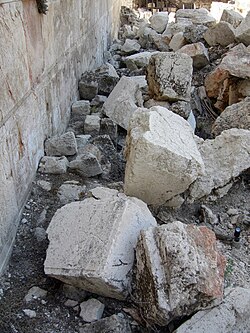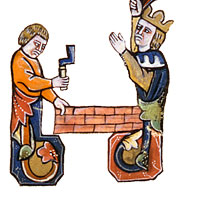 |
| Stones from the Western Wall of Jerusalem thrown down by Roman soldiers in 70 CE |
2
|
V/NV/JH
|
Nisi Dóminus
custodíerit civitátem, * frustra vígilat qui custódit eam.
|
ἐὰν μὴ κύριος φυλάξῃ πόλιν εἰς μάτην ἠγρύπνησεν ὁ φυλάσσων
|
Nisi (unless) Dóminus (the Lord) custodíerit (he will keep) civitátem (the city), * frustra (vainly) vígilat (he keeps watch) qui (who) custódit (he watches) eam (it).
custodio, ivi or li, itum, ire to guard, watch, keep;to maintain, to hold
steadfastly.
civitas, atis,
a city, state, commonwealth; the inhabitants of the city
frustra, adv.
in vain, vainly, to no purpose, uselessly.
vigilo, avi, atum, are to
be awake, keep watch, watch; to watch for, seek, long for.
DR
|
Unless the Lord keep the
city, he watches in vain that keeps it.
|
Brenton
|
Except the Lord keep the
city, the watchman watches in vain.
|
MD
|
Unless the Lord guard the
city, he watcheth in vain that guardeth it.
|
RSV
|
Unless the LORD watches over
the city, the watchman stays awake in vain.
|
Cover
|
Except the Lord keep the city, the watchman waketh but in vain.
|
Knox
|
Vainly the guard keeps
watch, if the city has not the Lord for its guardian.
|
Grail
|
If the Lord does not watch
over the city, in vain does the watchman keep vigil.
|
The city of God
The previous verse talked about the house of God; this one talks about a city, why? St Augustine tells us that the words mean the same thing:
But that which is the house of God is also a city. For the house of God is the people of God; for the house of God is the temple of God....This is Jerusalem: she has guards: as she has builders, labouring at her building up, so also has she guards...The obvious allusion in terms of the literal interpretation of the verse is to the rebuilding of Jerusalem after the return from exile, since as Ezra describes, half the men worked while the other half guarded the walls against neighbouring marauders intent on preventing the rebuilding effort, as St Robert Bellarmine points out:
When the city was being built after the captivity, they had to build it and guard it at the same time, as we read in 2 Esdras. The nations round about them not only sought to prevent them from building, but they demolished everything that was built if they could; and thus the children of Israel had to proceed with the sword in one hand, and the tools in the other, and many had to stand guard continually. Yet all this guarding would have been of no avail, had not the Lord chosen to guard the city.The destruction of Jerusalem
The verse can also, though, in the context of the Crucifixion, perhaps be taken as a a reference to the coming destruction of Jerusalem some forty years after the death of Christ, and prophesised by him in:
And when he drew near, seeing the city, he wept over it, saying: If thou also hadst known, and that in this thy day, the things that are to thy peace; but now they are hidden from thy eyes. For the days shall come upon thee: and thy enemies shall cast a trench about thee, and compass thee round, and straiten thee on every side, And beat thee flat to the ground, and thy children who are in thee: and they shall not leave in thee a stone upon a stone: because thou hast not known the time of thy visitation (Luke 19:41-44).The key point though, is that while we have to work hard, labouring and guarding against the enemy as if everything depends on us, in reality our efforts will be useless without God's aid:
Why mention erection of walls and building of the city? It would also have been impossible for anyone to guard it when brought to completion had that assistance not been available. Now, he said this to persuade them by every means to have recourse again to God's grace lest they become more indifferent owing to the respite. The reason, you see, why he gave them the good things not all at once but slowly and gradually was to prevent their running back to their former wickedness because of their rapid release from troubles; instead, even in the very giving of the good things he constantly reminded them by the onset of their enemies to be ever stirring up their indifference. So the words are of general application, while taking their origin in this occasion: it is necessary to bring them to bear on everyone's situation lest we ourselves become indifferent and supine instead of contributing what is in our power, entrusting everything to God, and completely depending in everything on hope in him. I mean, as it is not possible to bring affairs to completion without his help, likewise if God helps but we are idle and inactive, it is impossible for us to reach the goal. (St John Chrysostom)The watchmen
Many of the Fathers interpret the role of watchman as especially applying, after Christ, to bishops. Cassiodorus, for example, says:
We interpret the Lord's city as the heavenly Jerusalem, a part of which still lodges on earth. In it the bishops strive to keep watch, to protect with unsleeping care the flock entrusted to them. The same injunction is given them not to be fired by harmful thoughts, and imagine that human precautions have any dominant effect, for only the Godhead can ward off dangers of attack.St Robert Bellarmine though also applies the message to the individual Christian:
The same is very apt to occur to ourselves, when we, through good works, begin to build up a house, for enemies will not be wanting to seek to destroy the work so begun, by various temptations; and, hence, the apostle arms us when he says, "Wherefore take unto you the armor of God, that you may be able to resist in the evil day;" and a little further on, "In all things taking the shield of faith, wherewith you may be able to extinguish all the fiery darts of the most wicked one." But unless God be with us, to guard us who slumber so often, and fight for us, all our labor will be in vain.
Psalm 126: Nisi Dominus
Vulgate
|
Douay-Rheims
|
Canticum graduum Salomonis.
|
A gradual canticle of Solomon.
|
1. Nisi Dominus aedificaverit domum:*
in vanum laboraverunt qui aedificant eam.
|
Unless the Lord build the house, they labour in vain that build it.
|
2. Nisi Dominus custodierit civitatem:*
frustra vigilat qui custodit eam.
|
Unless the Lord keep the city, he watches in vain that keeps it.
|
3. Vanum est vobis ante lucem surgere:*
surgite, postquam sederitis, qui manducatis panem doloris.
|
2 It is vain for you to rise before light, rise after you have sitten, you that eat the bread of sorrow.
|
4. Cum dederit dilectis suis somnum:*
ecce hereditas Domini, filii merces, fructus ventris.
|
When he shall give sleep to his beloved, 3 behold the inheritance of the Lord are children: the reward, the fruit of the womb.
|
5. Sicut sagittae in manu potentis:* ita filii excussorum.
|
4 As arrows in the hand of the mighty, so the children of them that have been shaken.
|
6. Beatus vir, qui implevit desiderium suum ex ipsis:* non confundetur cum loquetur inimicis suis in porta.
|
5 Blessed is the man that has filled the desire with them; he shall not be confounded when he shall speak to his enemies in the gate
|
And continue to the next post in this series, notes on verse 3 of Psalm 126.





